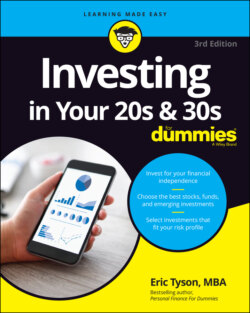Читать книгу Investing in Your 20s & 30s For Dummies - Eric Tyson - Страница 50
Stock returns
ОглавлениеThe long-term returns from stocks that investors have enjoyed, and continue to enjoy, have been remarkably constant from one generation to the next. Since 1802, the U.S. stock market has returned an annual average of about 9+ percent per year, or in other words about 6 to 7 percent per year above the rate of inflation. That’s a remarkable track record, but don’t forget that it’s an annual average return.
Now some people think that a 9 percent annual average return doesn’t sound like much. But at that rate of return, an investment will double in value every eight years.
Stocks have significant downdrafts and can easily drop 10, 20, or 30 or more percent in relatively short periods of time. Stocks can also rise dramatically in value over short periods. The keys to making money in stocks are to be diversified, to invest consistently, and to own stocks over the long run.
Stocks exist worldwide, of course, not just in the United States. When investing in stocks, go global for diversification purposes. Diversified portfolios of international stocks have produced annual returns comparable to those generated by U.S. stocks.
International (non-U.S.) stocks don’t always move in tandem with U.S. stocks. As a result, overseas stocks help diversify your portfolio. Thus, in addition to enabling U.S. investors to diversify, investing overseas has proven to be profitable over the years and decades.
Now, some folks make stock investing riskier than need be by doing some foolish things:
Chasing after specific stocks or sectors that have recently been hot: Yes, what a rich genius you’d have been if you’d invested in Apple stock (or Chipotle, Google, McDonald’s, Amazon, Ulta Beauty, or Facebook) when it went public. With the benefit of hindsight, it’s easy to spot the “best” stock investments (companies or sectors) over specific periods. It’s quite another thing to put your money on the line now and to hope and expect that you have the ability to pick the best-performing stocks of the future.
Excessive trading and market timing: Another type of wishful thinking occurs when folks would like to believe that they can jump into and out of the market at the right times to participate in moves higher and to sidestep downturns.
